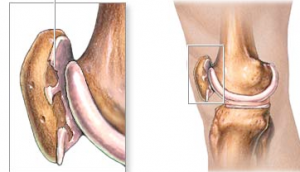Sport Rehabilitation and Physiotherapy for Anterior Knee Pain

What is Anterior Knee Pain (Chondromalacia Patella)?
Anterior knee pain, also sometimes known as Chondromalacia Patella, is the softening and degeneration of the cartilage beneath the kneecap (patella). Under normal circumstances the cartilage is smooth and shiny so it glides smoothly along the thigh bone (femur) as the knee bends.
What Causes Anterior Knee Pain (Chondromalacia Patella)?
Activities that require excessive repetitive bending of the knee and occurs more in; – Over 40’s – as the cartilage breaks down due to wear and tear. Teenagers – particularly girls, where the cartilage softens due to changing pressures on the knee joint due to growth and muscle imbalances at the knee.
What are the Symptoms? – General tenderness at the front of the knee that worsens after; – prolonged sitting, using stairs, standing after sitting and repetitive bending. A grating or grinding sensation may also be felt.
What will treatment for Anterior Knee Pain (Chondromalacia Patella) consist of?
Massage – Encompassing a variety of techniques with sufficient pressure through the superficial tissue to reach the deep lying structures. It is used to increase blood flow, decrease swelling, reduce muscle spasm and promote normal tissue repair.
Mobilisation – A manual technique where the joint and soft tissues are gently moved by the therapist to restore normal range, lubricate joint surfaces and relieve pain.
Ultrasonic Therapy – Transmits sound waves through the tissues stimulating the body’s chemical reactions and therefore healing process, just as shaking a test tube in the laboratory speeds up a chemical reaction. It reduces tissue spasm, accelerates healing and results in pain relief.
Interferential Therapy – Introduces a small electrical current into the tissues and can be used at varying frequencies for differing treatment effects. E.g. pain relief, muscle or nerve stimulation, promoting blood flow and reducing inflammation.
What other treatments could be used for Anterior Knee Pain (Chondromalacia Patella)?
Acupuncture – An oriental technique of introducing needles into the skin to increase or decrease energy flow to promote pain relief and healing.
Injection Therapy – A specialist procedure during which a non-harmful steroid and local anaesthetic are injected directly into the injured structure. It has a dramatic effect on removing inflammation and promoting healing.
Taping/Strapping – May be used if thought necessary to restrict abnormal movement and prevent further damage.
What can you do to help your Anterior Knee Pain (Chondromalacia Patella)?
Active Rest – Keep active but avoid activities that aggravate your condition i.e. static postures and any activity that may put a repetitive strain on the knee.
Apply an ice pack – For a maximum of 20 minutes. A bag of frozen peas wrapped in a damp cloth works well because it moulds to the shape of the tissues. Ensure that you do not apply ice directly to the skin as this can cause an ice burn.
Exercise programme – This is the most important part of the rehabilitation. Your therapist will instruct you as to which exercises to begin with, when to add the others, as well as how to progress the exercises.
Medication – Ask your GP or Pharmacist for advice on the best medication for your condition.
Podiatry – An analysis of the foot mechanics and structure during walking or running and correction as appropriate.
What if physical therapy does not help or resolve Anterior Knee Pain?
It is very rare that treatment does not resolve this condition. In these cases a steroid injection may help or we will refer you on for further investigation.
If you think you may have this condition we would love the opportunity to show you our expertise in the treatment and management of this condition so – Please click here for details of how to contact us to book an appointment
If you are unsure whether you have this condition or you would just like to speak to somebody then please get in touch here or call 0161 745 7551 or 0151 515 2323.
